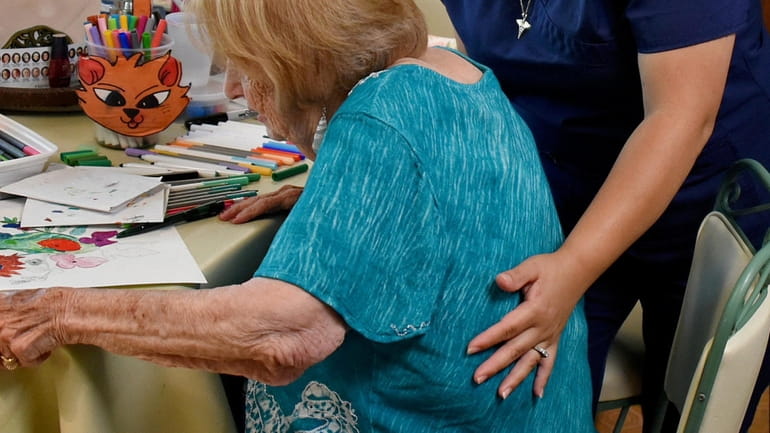I know from experience that our health care system depends on immigrants

In many states, high percentages of health care support workers — nursing assistants, personal care aides and home health aides — are immigrants. Credit: Danielle Silverman
My parents spent their last years in a retirement community in Westchester County. They largely enjoyed the place and the people with one caveat — what they called the dinnertime “Organ Recitals.” These had nothing to do with a Wurlitzer or Hammond but were recitations of what was wrong with people’s internal organs. As in, “Oy, my bladder is acting up.” Or, “Did I mention my liver problems?”
I vowed never to fall prey to that tendency as I aged. Except last year, I experienced a series of unfortunate health incidents. In January, I had bladder stone surgery, leading to complications including pneumonia and a urinary tract infection. In February, I developed a compression fracture of the back. In March, I fainted, and because of a preexisting heart condition called hypertrophic cardiomyopathy, had a defibrillator installed in my chest. Then I suffered esophagitis and a pulmonary embolism, and underwent a procedure called kyphoplasty for my back. All told, I spent most of March, April and May in a hospital and rehab.
But don’t feel sorry for me. I survived and have even been able to return to playing my actual musical instruments — piano and guitar.
The primary organ still affected is the part of my brain that stores appreciation and rage. Appreciation for having Medicare and supplemental insurance from my former job, and for the wonderful people who took care of me — doctors, nurses, aides, techs, custodians. Rage at those who continue to deny that care to tens of millions of Americans and those who demonize and try to keep out the vast majority of the people who kept me alive and relatively comfortable — immigrants.
Over 25 million Americans have no health insurance — a figure the Congressional Budget Office expects to rise to 35 million by 2029. More than three million people are uninsured in 10 states because the party in power in those states refuses to expand Medicaid, despite little or no cost to the states.
In the hospital and rehab, I had time to think about people not fortunate enough to have health insurance or qualify for Medicare. Would they get all the CT scans, MRI’s, blood tests, procedures, medications, and 24/7 care I did? Even if they did get that care, would they be able to escape medical bankruptcy? According to the Kaiser Family Foundation, more than 100 million Americans have been pushed into massive debt from health care costs — including tens of millions who are insured, but underinsured.
Most people giving me care were immigrants, especially among health support staff. In many states, high percentages of health care support workers — nursing assistants, personal care aides and home health aides — are immigrants. It's more than 50% in New York, more than 41% in California, and more than 37% in Florida, according to the Migration Policy Institute. Significant percentages of doctors, nurses and technical staff are immigrants. I received excellent care day and night in the hospital and rehab primarily from people from the Philippines and the Caribbean. Like prior generations of immigrants, they are making essential contributions to this country while seeking a better life here. And like everyone else, they deserve the health care they are giving others.
So I have no more patience for those who continue to limit care to tens of millions and no patience for those who demonize immigrants. We need them as much as they need us.
This guest essay reflects the views of Manhattan resident Peter Janovsky, a former city high school social studies teacher and attorney practicing commercial litigation and bankruptcy.
